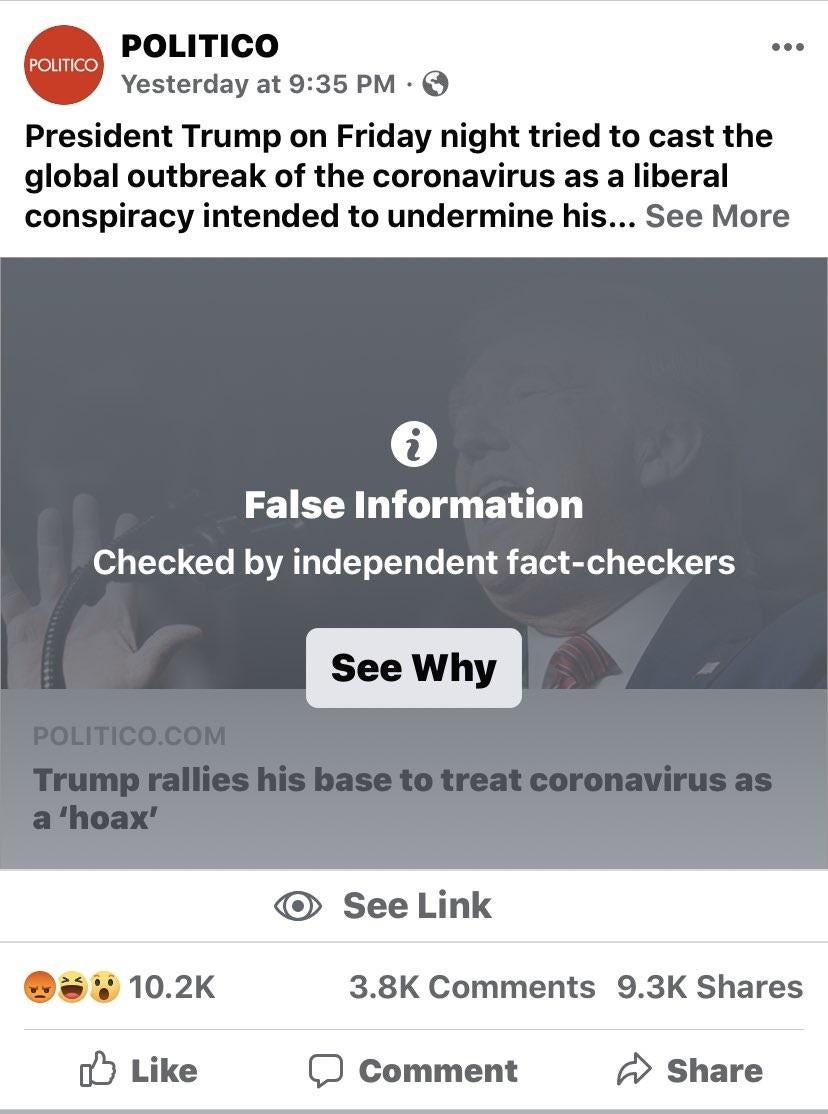Coronavirus ‘hoax’: Trump comments spark feud over Facebook’s fact checking
‘This is their new hoax,’ US President tells campaign rally crowd

Your support helps us to tell the story
From reproductive rights to climate change to Big Tech, The Independent is on the ground when the story is developing. Whether it's investigating the financials of Elon Musk's pro-Trump PAC or producing our latest documentary, 'The A Word', which shines a light on the American women fighting for reproductive rights, we know how important it is to parse out the facts from the messaging.
At such a critical moment in US history, we need reporters on the ground. Your donation allows us to keep sending journalists to speak to both sides of the story.
The Independent is trusted by Americans across the entire political spectrum. And unlike many other quality news outlets, we choose not to lock Americans out of our reporting and analysis with paywalls. We believe quality journalism should be available to everyone, paid for by those who can afford it.
Your support makes all the difference.Facebook‘s supposedly independent fact-checking division has once again been called into question after a “false” label was added to an article that attempted to unpick the meaning of a rambling speech made by Donald Trump.
It all centres around an ambiguous statement made by the US president at a campaign rally in South Carolina, where he referred to the Covid-19 coronavirus as the “new hoax” of the Democrat party.
He told the crowd: “Now the Democrats are politicising the coronavirus ... One of my people came up to me and said, ‘Mr President, they tried to beat you on Russia, Russia, Russia, that didn’t work out too well. They couldn’t do it. They tried the impeachment hoax, that was on a perfect conversation. They tried anything, they tried it over and over, they’ve been doing it since you got in. It’s all turning. They lost, it’s all turning, think of it, think of it, and this is their new hoax’ ... We have lost nobody to the coronavirus ... The press is in hysteria mode.”
At the time there had been no coronavirus-related deaths in the US. Within two days the country recorded its first coronavirus death and there have since been nine deaths among more than 100 confirmed cases in the country.
Trump’s comments prompted various publications and broadcasters to associate the word “hoax” with the coronavirus. One of the outlets was Politico, which reported on the rally with the headline: “Trump rallies his base to treat coronavirus as a ‘hoax’”.
When the story was posted to Facebook, the fact-checking division of the controversial right-wing publisher The Daily Caller applied a “false” label to the story, meaning it appeared in people’s News Feeds with a “False Information” warning.
The story was also demoted in the News Feeds of Facebook users, meaning it would be less likely to be read or shared.
This prompted wide-spread criticism that the Daily Caller’s Check Your Fact division was able to use its power to suppress negative Trump coverage, with many people on Facebook and across social media claiming the takedown was politically motivated.
Others, however, pointed out that the “hoax” that Trump referred to could be interpreted as the Democrats’ framing of how the Trump administration is handling the coronavirus outbreak, rather than the actual virus itself.
Shortly after the first death was announced, Trump was asked at a White House press conference whether he regretted his comments.

He said he used the word to describe “the action [Democrats] tried to take to try to pin this on somebody because we’ve done such a good job”.
He added: “The hoax is on them. I’m not talking about what’s happening here ... I don’t like it when they are criticising [health officials], and that’s the hoax.”
Facebook distanced itself from any responsibility over the label, saying in a statement: “All fact-checkers on Facebook are certified by Poynter’s International Fact-Checking Network and work independently of Facebook. There’s an appeals process in place for publishers to dispute a rating by reaching out directly to any certified fact-checker.”
Digital media specialist Mathew Ingram, who writes for the Columbia Journalism Review, questioned the role of The Daily Caller in any fact-checking endeavour, though said that ultimately the questions surrounding the Politico article are legitimate.
“At the risk of diving into a dumpster fire, I appreciate the criticisms of The Daily Caller’s fact-checking unit being a Facebook partner, but their fact-check of Politico’s story — which implied Trump called the virus a hoax — is accurate,” he tweeted. “In other words, they are right.”
Join our commenting forum
Join thought-provoking conversations, follow other Independent readers and see their replies
Comments